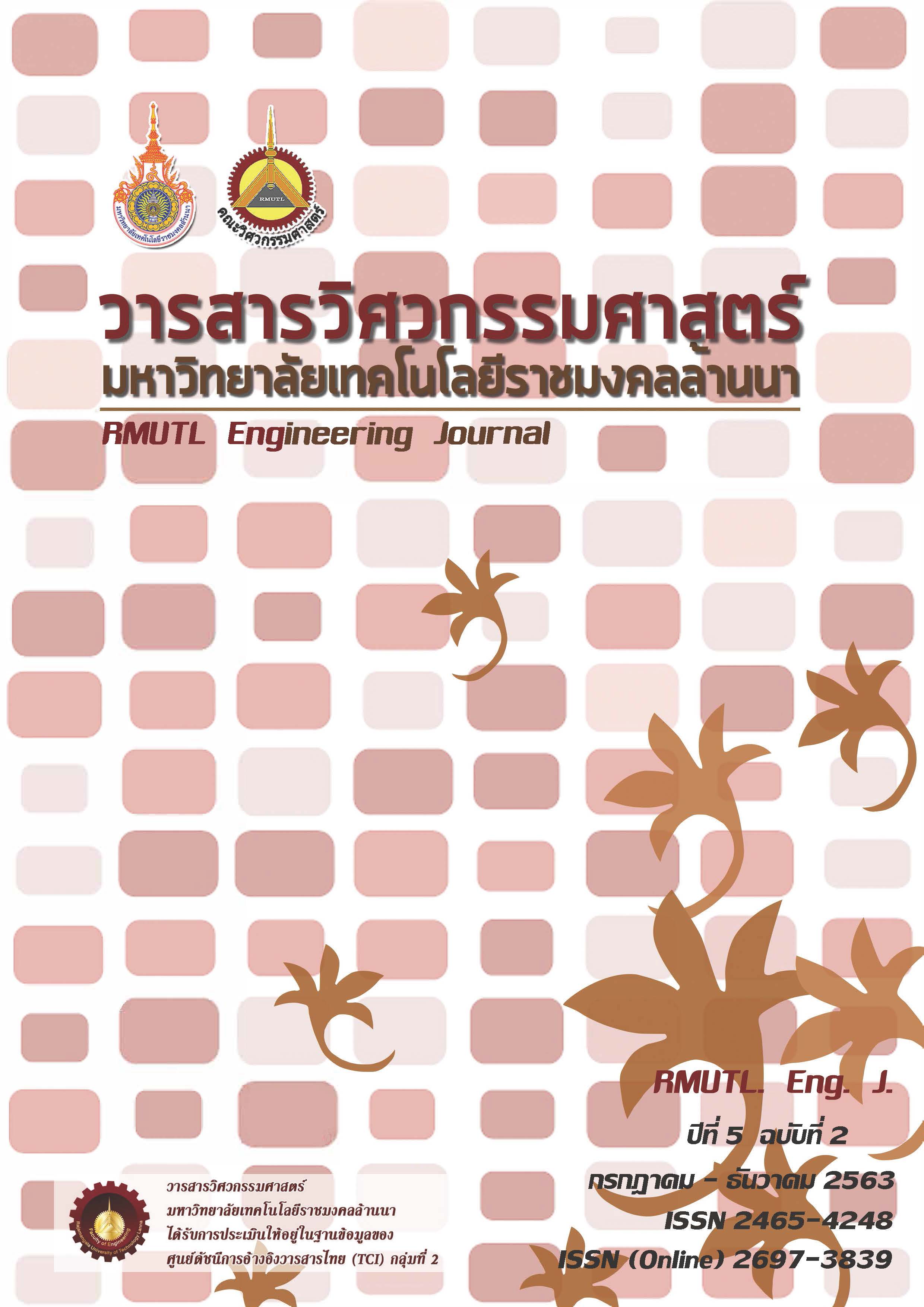Development of Charcoal Briquette Produced from Small Fragments Charcoal of Thong Saen Khan Community Biomass Power Plant Using Solid Alcohol to Ignite and Combust Charcoal Briquette
DOI:
https://doi.org/10.14456/rmutlengj.2020.10Keywords:
Biomass Power Plant, Charcoal Briquette, Combustion, Ignition, Solid AlcoholAbstract
Charcoal fragments of Thong Saen Khan Community Biomass Power Plant are small in size. When ignited, it can not ignite and combust continuously in household furnace. The objective of this research is to develop small charcoal fragments of Thong Saen Khan Community Biomass Power Plant with increased ignition and combustion. The small fragments charcoal be done by cutting and milling and densification process to produce cylindrical charcoal briquette. In addition, the development focuses on charcoal briquette production process by mixing with solid alcohol (2.16 %, 4.48 %, 7.04 % and 10.00 % by weight) or alcohol dip coating, compared with charcoal briquette without mixed with solid alcohol. The result shows that solid alcohol mixing process and alcohol dip coating provide better results (the duration of ignition and combustion of charcoal briquette until the whole of charcoal briquette turned red) than non-mixing solid alcohol. The thermal energy generated by combustion reaction of 200 grams charcoal briquette when used as fuel in household furnace. It was found that the second formula of the charcoal briquette, which was mixed with solid alcohol 2.16 % by weight, gave the highest thermal energy as 303,000 calories. In addition, the highest water temperature in the pot (87 ºC) was achieved in 20 minute of combustion time. While the total combustion time until the charcoal briquette extinguished was 96 minutes. The second formula of the charcoal briquette was the most suitable to be used as a biomass fuel in household stoves.
References
2.Wattanachira L, Laapan N, Chatchavarn V, Thanyacharoen A, Rakruam P. Development of biobriquettes from mixed rice-straw and longan waste residues. KMUTT Research and Development Journal. 2016; 39(2):239-255.Thai.
3.Tangmankongworakoon N. The production of fuel briquettes from bio-agricultural wastes and household wastes. Srinakharinwirot University (Journal of Science and Technology). 2014; 11:66-77.Thai.
4.Jutajan W. A study of charcoal burning process and properties of briquetted charcoal from vetiver grass. Journal of Industrial Technology Ubon Ratchathani Rajabhat University. 2019; 9(2):135-46.Thai.
5.Wilaipon P, Chareonsawan P, Srihawong N, Menkoed C, Prakobkasikorn P, Kumboon P. Briquette ratio investigation of charcoal briquette produced from brick-burning-process residual charcoal. RMUTL. Eng. J. 2019; 4(1):43-50.Thai.
6.Chanchaiphoom H. Charcoal from shell tamarind. In: RTUNC 2018: Proceedings of the 3rd National Conference; 2018 May 25; Thailand, p. 288-96.
7.Jangsawang W. Gas technology for production of producer gas from biomass. Bangkok: Danax Inter Corporation Company; 2013.
8.Koolwattanaporn S. Resource center, food and drug administration. Production of solid alcohol. Available from: http://elib.fda.moph.go.th/library/default.asp page2=subdetail&id_L1=27&id_L2=15672&id_L3=1128 [Accessed 11th February 2020].
9.Soontraruk S, Makmoon D, Wongmalee W. The development of charcoal fuel briquettes from eucalptus leaves and brasiliensis leaves. In: NIRC II 2018: Proceedings of the 2rd National and International Research Conference; Thailand, p. 339-348.
10.Chuaythong T, Chaichana T, Amloy S. Properties of charcoal from areca catechu linn shells. Thaksin University Journal. 2014; 39(2):68-75.Thai.
11.Chutsawang N. Charcoal briquette from durian husk in Tombol Kwuanhuk community enterprise, Khlung, Chanthaburi. M.Eng. Thesis. Rambhai Barni Rajabhat University; 2013.
12.Torsakul S, Thongsri K, Supharattana C. Development of charcoal briquette from scrapped coconut for alternative energy. In: IE Network Conference 2012: Proceedings of the Industrial Challenges in the ASEAN Economic Community; 2012 October 17-19; Thailand, p. 1381-86.
13.Boontheung N. The physical and thermal properties of compressed corncob coconut shell compostie charcoal using bio-fermentation as a binding agent. M.Sc.Thesis. Chiang Mai Rajabhat University; 2011.
14.Tippayawong N. Gas Technology for Biomass Transformation. Bangkok: TPA Publishing; 2012.
15.Wikipedia. Ethanol. Available from: https://en. wikipedia. org/wiki/Ethanol [Accessed 15th April 2020].










